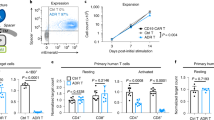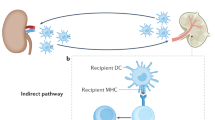Abstract
Kidney allografts between inbred rats differing at the major histocompatibility complex (MHC) are normally rejected, usually within 10 to 12 days. In many strain combinations, however, permanent graft acceptance can be induced by either immunological enhancement1,2 or a short course of immunosuppressive chemotherapy3–5. In both cases, prolonged graft survival is accompanied by the appearance in the spleen of a population of suppressor cells6. When transferred to a syngeneic host, these cells abrogate or strikingly diminish the rejection response elicited by a renal allograft of the same genotype as the original kidney donor. We have now examined the properties of these suppressor cells and have detected a subpopulation that proliferates in vitro when stimulated by irradiated syngeneic T blasts reactive to MHC alloantigens of the kidney donor strain. Comparable proliferation, however, is not induced either by syngeneic blasts reactive to a third strain or by polyclonal syngeneic blasts. These results support the hypothesis that this subpopulation is anti-idiotypic, with specificity for the idiotypes carried by syngeneic T cells stimulated by the kidney allograft. Such anti-idiotypic cells could function as suppressors.
This is a preview of subscription content, access via your institution
Access options
Subscribe to this journal
Receive 51 print issues and online access
$199.00 per year
only $3.90 per issue
Buy this article
- Purchase on Springer Link
- Instant access to full article PDF
Prices may be subject to local taxes which are calculated during checkout
Similar content being viewed by others
References
Batchelor, J. R. Transplantation 26, 139–141 (1978); Transplantn Proc. 13, 562–565 (1981).
Morris, P. J. Immun. Rev. 49, 93–125 (1980).
Britton, S. & Palacios, R. Immun. Rev. 65, 5–22 (1982).
Hutchinson, I. V., Barber, W. H. & Morris, P. J. Transplantn Proc. (in the press).
White, D. J. G. & Calne, R. Y. Immun. Rev. 65, 115–131 (1982).
Chui, Y. L. & Batchelor, J. R. Transplantation (in the press).
Lechler, R. I. & Batchelor, J. R. J. exp. Med. 155, 31–41; 156, 1835–1841 (1982).
Batchelor, J. R., Phillips, B. E. & Grennan, D. Transplantation 37, 43–46 (1984).
Green, C. J. & Allison, A. C. Lancet i, 1182–1183 (1978).
Andersson, L. C., Binz, H. & Wigzell, H. Nature 264, 778–780 (1976).
Dorsch, S. & Roser, B. Transplantation 33, 518–524; 525–529 (1982).
Stockinger, B. Proc. natn. Acad. Sci. U.S.A. 81, 220–223 (1984).
Stephenson, S. P. & Roser, B. Transplantn Proc. 17, 1145–1147 (1985).
Kimura, H. & Wilson, D. B. Nature 308, 463–464 (1984).
Author information
Authors and Affiliations
Rights and permissions
About this article
Cite this article
Lancaster, F., Chui, Y. & Batchelor, J. Anti-idiotypic T cells suppress rejection of renal allografts in rats. Nature 315, 336–337 (1985). https://doi.org/10.1038/315336a0
Received:
Accepted:
Issue Date:
DOI: https://doi.org/10.1038/315336a0
This article is cited by
Comments
By submitting a comment you agree to abide by our Terms and Community Guidelines. If you find something abusive or that does not comply with our terms or guidelines please flag it as inappropriate.



